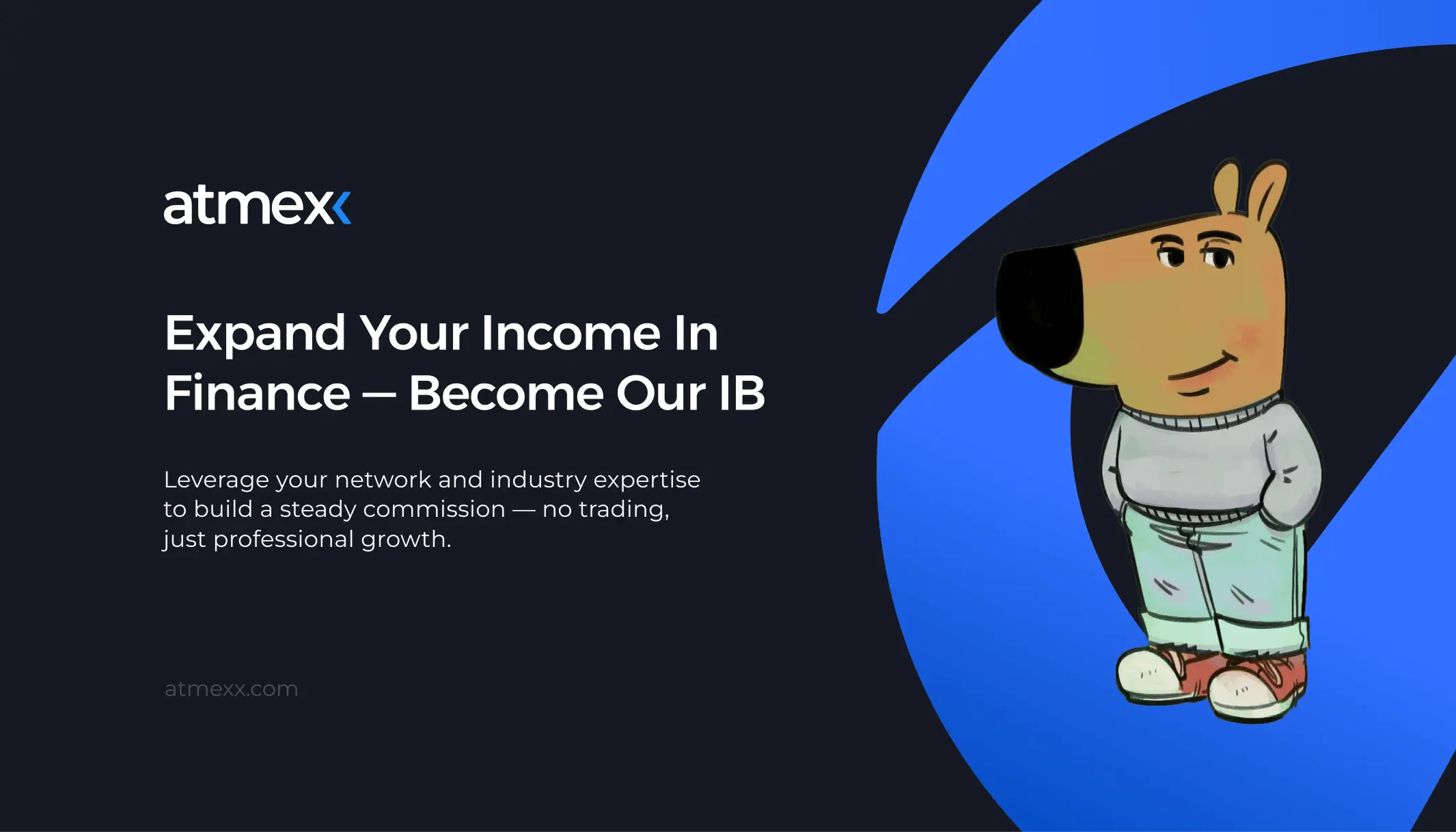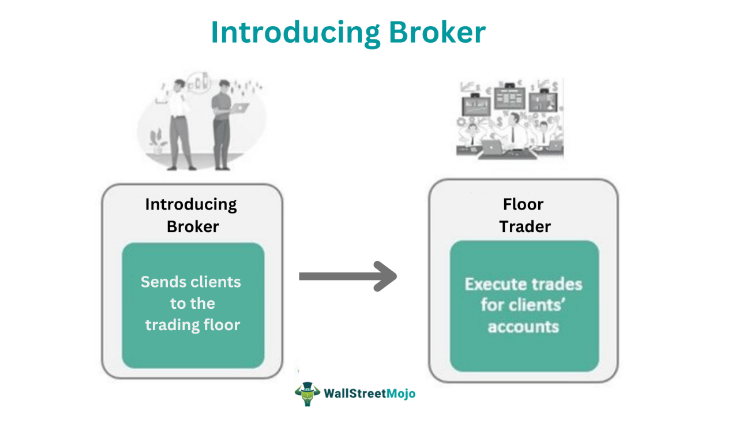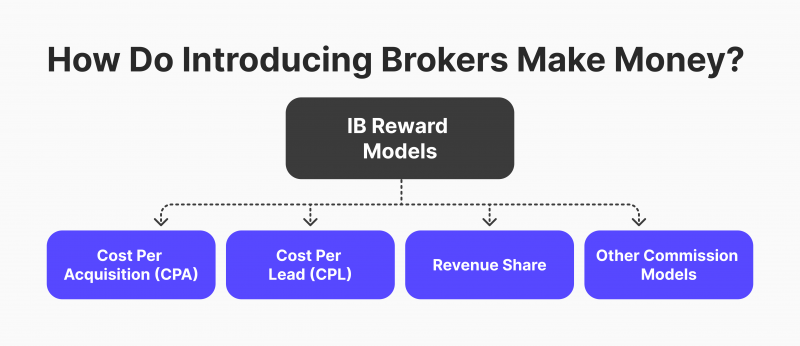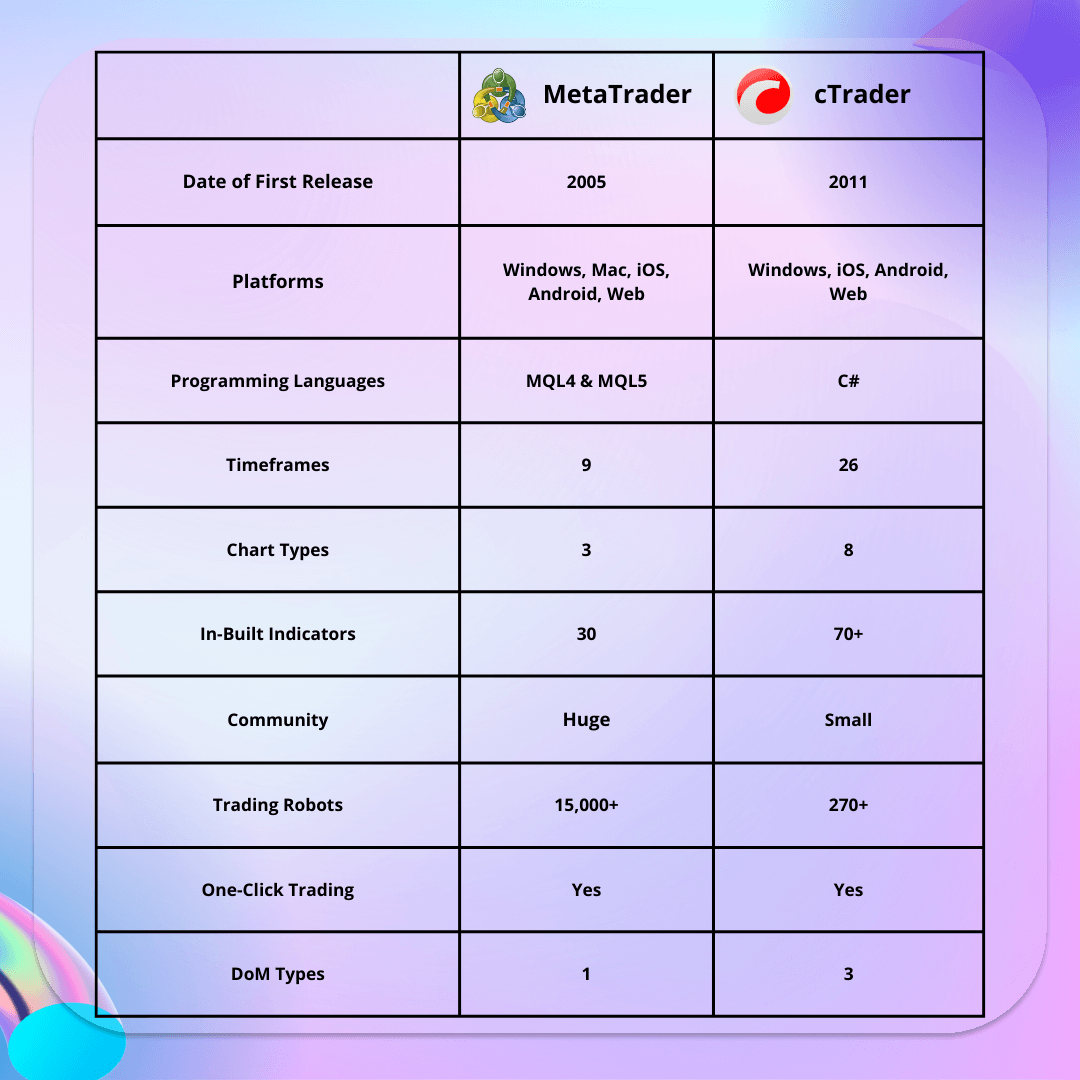
Share

Related articles
Author
Constantine Blake
Imagine maintaining a steady stream of passive income with never a trade being made, complicated portfolios to juggle, nor sleepless nights scanning the markets. That is exactly what it is to become an introducing broker (IB) — a smart, scalable, and low-risk way to financialize your network, content, or personal brand.
This step-by-step guide will show you exactly how to open your IB business in 2025 — with absolutely no trading experience needed — and how to use tools like CRM programs, marketing collateral, and broker tools to build a long-term, passive income empire.
An introducing broker (IB) is an individual or firm that matches prospects — typically retail or institutional traders — with a brokerage and is compensated with a percentage of revenue generated by referred traders' trading volume. Unlike a full-service broker or dealing broker, an IB does not execute orders nor has custody of clients' money.

Instead, their only task is to "introduce" new clients to the broker, usually with promotional efforts, referral communities, or education sites. Once clients are introduced, all operational stages—execution, clearing, and support—belong to the broker while the IB derives passive income through trading volume with their introduced client.
The appeal of being an IB is its low startup cost and scalability. There is no need to be a trained trader or have high-end infrastructure to get started. The majority of successful IBs operate out of a laptop and rely upon content creation, webinar marketing, social networking, or local networking to establish credibility and grow their base of referrals.

The more volume there is, the greater the potential for commission — frequently in the guise of lifetime revenue sharing. The IB approach thus provides a compelling way to earn passive income, especially for influencers, instructors, and entrepreneurs seeking to capitalize on their following without ever entering a trade personally.
Introducing broker profits by sending new customers—often traders or investors — to a brokerage house, and later receiving some of the revenue generated by those clients through their trading activities.
This revenue is usually earned by spreads (the difference between the buying and selling price), commissions, and any other trading fees arranged by the broker. Once a referred customer starts to trade, the IB receives its passive income stream, typically for the duration of the customer's account life, subject to the agreement framework of their broker.

In the Foreign Exchange marketplace, this system is formalized by a Forex introducing broker program or a Forex IB program with the intention of rewarding customer acquisition and long-term customer retention.
These programs are like a Forex affiliate program but with greater depth: while affiliates are usually responsible for one-time CPA payments per acquisition, an introducing broker is rewarded with ongoing revenue based upon ongoing client activity. This presents an attractive business opportunity for those seeking to establish a sustainable and scalable source of revenue without compromising their personal interests.
For a typical introducing broker program, IBs are compensated proportionately to the volume their traders trade. For example, the IB receives a larger payout if a referred trader places many trades or trades large volumes.
The majority of brokers also offer multi-level programs through which mature IBs can recruit sub-IBs and hence build their network. This organizational framework generates additional revenue from other people's efforts—a tactic preferred by the highest-introducing brokers who scale their business like an agency.
Unlike the ordinary Forex affiliate, who is only paid once for each registration, the Forex introducing broker system pays a lifetime value (LTV) per customer. It is therefore more profitable in the long term.
As long as an active and continuously trading client is with them, the IB receives commissions month by month — all while never having to execute a trade personally. This consistent income stream is why the Forex IB program stands out and why it is a solution of choice for finance influencers, educators, and entrepreneurs.
Introducing a broker is among the most sought-after ways to enter the financial services industry, with no trade and with no customer funds involved. As a standalone financial specialist, you can have passive income by linking traders to trustworthy brokerage houses using this system.
These are the key advantages of taking this business path:
The key benefit of the IB program is its repeat revenue generation. Unlike pay-per-sale affiliate marketing, where one is entitled to a one-time payment per transaction, introducing brokers are rewarded with a percentage of revenue by the broker so long as their referred traders are active.
One referral can create a steady monthly income out of ongoing trading activity—hands-on management is never a requirement.
One does not necessarily need to be a veteran trader and analyst to become an IB. The system is founded on relationship and referral management, rather than risk-taking and speculation.
This enables a broader set of professionals—such as instructors, influencers, or community leaders—to earn a revenue stream through the trading industry while assuming no market exposure.
Opening up as an introductive broker is not capital-intensive at all. Free onboardings are offered by most brokerages with initial training literature and promotional materials to facilitate startup by IBs.
You can do it alone with minimal infrastructure—often just a laptop computer, website, weblog, and selective outreach strategy.
The system is very scalable, whether you are discussing a handful of retail traders or building a local network of sub-IBs. Some of the most profitable forex-introducing brokers begin as individuals and evolve into agencies with local partners, CRM infrastructures, and branded customer portals.
You can progress from individual marketing to overseeing teams and receiving overrides on referrals from your sub-IBs.
As an IB, you have total flexibility as to how and where you work. There are no set office hours to work towards, and you can work through various geographies thanks to the global coverage possible through online trading.
Whether you're promoting webinars, running email campaigns, or connecting with others through social sites, you pick the strategy to suit your lifestyle.
Being an IB with a regulated and reputable broker increases your credibility in the finance arena. It gives you access to networking with financial players, access to events, and diversification to other revenue streams through education services, market signals, or fintech arrangements.
Top-of-the-line IB programs provide guaranteed recurring support—account managers, live tracking tools, marketing materials, brand collateral, and training webinars. This support system enables you to focus on customer acquisition and retention while leaving the backend to the broker to handle.
The ultimate underrated advantage: you retain ownership of the client relationship. So long as your client keeps trading, you keep generating revenue.
Very few business models offer this long-tail revenue stream, least of all when the client never has to purchase from you themselves. The lifetime value (LTV) of a single trader can span years, and its value is thereby potentially high with each referral.

To become an introducing broker, you go through a straightforward but intentional process and can unlock a long-lasting passive income stream.
Even with a comparatively affordable cost to enter, it requires cooperation with an ideal broker and establishing confidence among your ideal clientele to find success.
This is a full step-by-step account to begin your IB experience properly:
Before you begin, it is worth taking some time to get to know the fundamentals of the IB model. Get to know how broker programs are set up, how you will be getting commissions—through spreads, volume trading, revenue sharing—and who your ideal customer is.
Besides that, differentiate a Forex affiliate program (more traffic and registration-based) from a Forex IB program with relationship-building and clientele retention orientation for steady income.
Your broker is essentially a business partner, so reliability and reputation are crucial. Choose a regulated broker with a reasonable commission reputation, decent platforms like MT4/MT5 or cTrader, timely payments, and satisfactory IB support.

Some of the best-quality intro broker programs offer marketing materials, CRM dashboards, and white-label solutions to scale with you. Be certain to research programs side-by-side before committing.
After you choose your broker, you'll sign up for their IB registration process. This involves typically entering basic information, successfully completing KYC verification, and accepting the terms of partnership.
Once you're accepted, you'll have access to your dashboard, referral link, and whatever tools are offered by the broker. There are brokers with tiered entry levels—by beginning as a Forex affiliate and progressing all the way to the whole IB level as you do better.
There are various traders out there, and you'll want to find a niche for yourself. You can cater to starting retail traders, seasoned crypto enthusiasts, or institutional clients.
Having an explicit audience facilitates the creation of compelling messages and campaign designs, especially those with community specificity, using platforms like YouTube, Telegram, or Discord.
This is the engine of your IB business. Utilize your broker's referral tools—banners, tracking links, and landing pages with customizable templates—on different channels.
Social posts, blog entries, webinars, e-mails, and yes, local seminars can all generate quality leads for you. The key is to create trust and be perceived as a savvy and credible guide through the trading realm.
Once you have a trader registered, getting them activated is another hurdle. Presenting value through educational materials, regular communications, or personalized assistance can go a long way.
Many brokers compensate IBs based on a customer's lifetime value (LTV), and keeping high interaction is sure to cost you money in the long term.
Monitor your performance by using the broker's IB dashboard. See how many active clients you have, how much you are trading per client, and how campaigns are converting.
Use this data to refine your marketing campaigns, weed out non-performing efforts, and redouble efforts that are gaining momentum. Top-tier Forex IB programs will allow you to view this data in real time.
As your business grows, you should recruit other IBs under your umbrella. This creates a commission override structure that benefits you as well from their performance.
Recruiting sub-IBs can increase your aggregate revenue while positioning you as a niche leader—a strategy favored by a majority of the best-introducing brokers.
To become a thriving Introducing Broker, you'll need something more than a referral link—you need a business-level toolkit with lead generation, relationship management, and long-term customer care. The best IBs treat their work like a business and scale effectively with automation, metrics, and content.
These are three necessary buckets of tools and resources all IBs need to consider:
At the root of any effective IB operation is a customer relationship management system. It will help you with lead management, customer behavior tracking, and follow-up prioritization.
For example, you can see who has clicked through to your referral link, who registered but hasn't deposited yet, and who is trading actively. This gives you clarity on when to follow up or offer assistance.
While most brokers offer in-house IB dashboards with limited analysis, pro IBs often prefer third-party CRMs like HubSpot, Zoho, or Pipedrive to have broader control and flexibility.
These allow you to automate follow-ups, monitor campaign performance, and never allow an opportunity to slip through the cracks—all imperative when you're dealing with multiple funnels or clusters of clients.
Client activation doesn’t end at registration. To keep clients active and maintain their loyalty, you need to provide value continuously—and that is where content and email marketing tools shine through.
Platforms such as WordPress, Wix, or Ghost permit you to share valuable content such as trading guides, trading platform tutorials, and marketplace updates to develop authority and credibility.
For ongoing communication, you can set up email sequences with software like Mailchimp, Brevo (Sendinblue), or ConvertKit to take clients step by step through onboarding and funding and keep educating and engaging them with newsletters and automated campaigns.
These efforts significantly enhance your lifetime value per customer (LTV) and boost your credibility as a reliable partner.
Best-of-breed brokers realize educated clients are active clients, and so frequently provide pre-designed educational materials for IBs to share with their referral base. These may consist of downloadable e-books, training videos, webinars, guides to platforms, and even market perspectives—all to educate your referral base.
These resources minimize the lift to your support efforts and can be repurposed as branded materials. Some brokers have co-branded or white-label materials available to you to present yourself more professionally while maintaining your audience.
Being an introducing broker is bigger than a side income — it’s a legitimate business opportunity founded on trust, education, and long-term relationship-building. The simplicity of the IB formula is its greatest asset: it brings traders to a credible broker like Atmexx and earns lifetime commissions from their trading activity.
It is quick and easy to join. Visit Atmexx IB Program, register for free membership, and you will receive your personal referral link immediately. Promote it through social networks, website, or personal network, and track your commissions using our live IB tracking panel. Your financial freedom is a click away — convert your network to a powerful source of revenue with Atmexx.
Does one need trading experience to become an IB?
No. Trading knowledge is a plus, but it is unnecessary. Your job is to refer clients, not to trade.
What is my payment threshold?
You begin to earn once a referred customer commences trading, and can do so within a matter of days after registering.
Is it free to become an introducing broker?
Yes, they all offer free onboard facilities and registration to new IBs.
What is the difference between an IB and a Forex affiliate?
Affiliates generally receive pay once per transaction, whereas IBs earn periodic income through customer trading volume.
Can I work as an IB globally?
Yes, some brokers support global IBs, but you'd like to ensure local approval requirements.